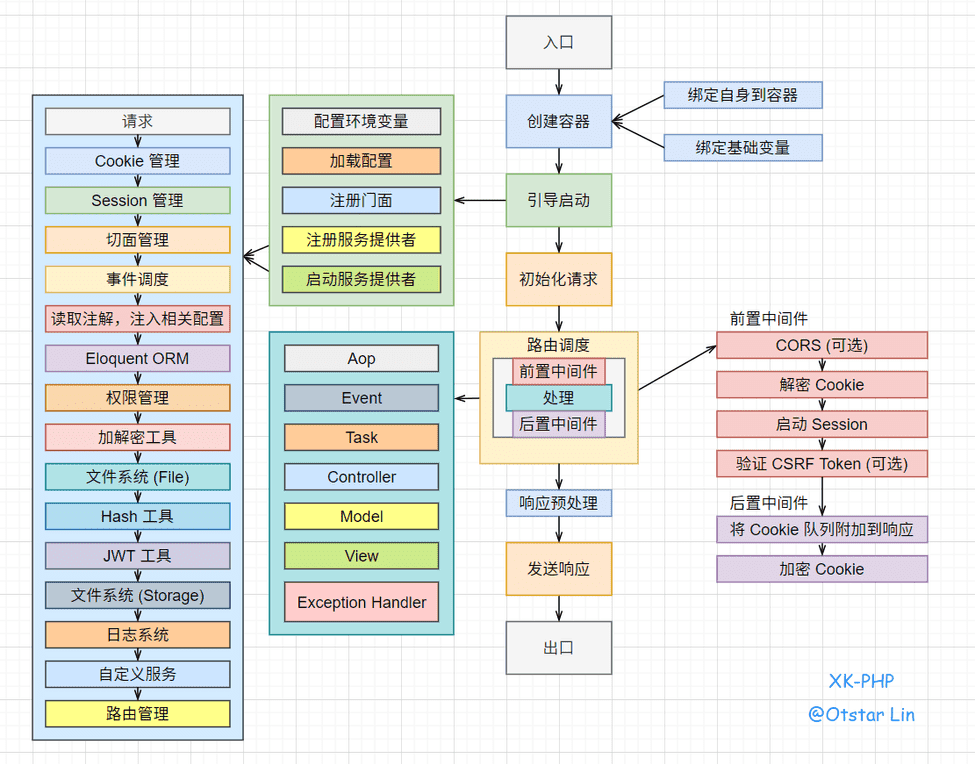前言
前不久为了准备用 PHP(原本打算是用 Spring,但是还不太会 233) 写一个博客项目,因为不打算使用任何框架,于是便打算自己写一个应用模板来完成博客这个坑。由于之前用过 Laravel 并且很喜欢 Laravel 接口的风格,一开始打算是弄一个接口与 Laravel 类似的模板,所以就没有考虑到 PSR 相关的标准。后来由于博客项目暂时咕掉了 ?,而且 PHP 模板也逐渐完善便打算将其作为一个独立的项目来进行开发。
在开发的期间学习了许多有趣的功能和设计模式,看了不少 Laravel 的文章和源码(XK-PHP 有部分代码是基于 Laravel 缩水而来,当然也有不少添加了一些功能 ?)。
最近 XK-PHP 已经趋于完善,于是就打算把开发过程遇到的坑和学到的知识写成文章,做下记录顺便分享给有想了解框架如何实现的同学们。
本系列文章(没错,我要水好几篇文章 ?)主要是围绕着 XK-PHP 的实现过程展开,同时也会提及 Laravel 和 Swoft 等 PHP 框架的代码或问题。(预计可能会写好几个月
目录
- 从零实现一个 PHP 微框架 - 前言
- 从零实现一个 PHP 微框架 – PSR & Composer
- 从零实现一个 PHP 微框架 – IoC 容器
- 从零实现一个 PHP 微框架 – Bootstrap 启动加载
- 从零实现一个 PHP 微框架 – 服务提供者
Github 地址
目前 XK-PHP 大部分的功能均已完成,如果不想看文章的话也可以直接到 Github 上查看代码。
主要功能
- IoC 容器,兼容 PSR-11
- 中间件,兼容 PSR-15
- 请求和响应,兼容 PSR-7
- 注解
- Aop
- MVC
- Facade
- ReactJS 集成,类似于 Laravel Mix
- 简单事件系统
- 简单任务队列,类似于协程,但是是同步阻塞的,只是可以主动让出
- PHPUnit 单元测试,HTTP 测试
- 响应异常处理
- 日志系统
- 模板系统,类似于 Yii 的视图
- ......
流程图

框架成果
<?php
namespace App\Controllers;
use ...
class HomeController
{
/**
* @var Request
* @Autowired("App\Http\Request")
*/
public $request;
/**
* @var Hash
*/
public $hash;
public function __construct(Hash $hash)
{
// 如果不使用注解注入类属性,则可以使用构造器注入
$this->hash = $hash;
}
/**
* @param Request $request
* @param AnnotationReader $reader
* @return View
*
* @DI\Set({
* @DI\Item(name="request", value="request")
* })
*/
public function index($request, AnnotationReader $reader): View
{
return view('home')->filter(function (string $content) {
return preg_replace('/>(\s*)</', '><', $content);
});
}
/**
* @param Request $request
* @return View
* @Route\Get("/home/home")
*/
public function home(Request $request): string
{
return view('home');
}
/**
* @param Request $request
* @return string
*
* @Route\Get("/jwt")
*/
public function jwt(Request $request): string
{
return JWT::decode($request->query('jwt'));
}
/**
* @param Request $request
* @return bool
*/
public function get(Request $request): bool
{
return true;
}
/**
* @param Request $request
* @return bool
*
* @Route\Get("/exce")
*/
public function exception(Request $request): bool
{
Log::info('Info', 'Info', ['Info']);
Log::debug('Debug', 'Debug', ['Debug']);
Log::warn('Warn', 'Warn', ['Warn']);
Log::error(new MethodNotAllowedException('Error'));
Log::fatal(new MethodNotAllowedException('Fatal'));
report('info', 'Info Function');
abort(403);
return true;
}
/**
* @param int $path
* @param int $query
* @return string
*
* @Route\Get("/inject/{path}")
*/
public function inject(int $path, int $query): string
{
// IoC 容器会自动将参数名作为 key 在绑定的实例和 Request 中寻找匹配的字段,然后进行注入
return $path . ',' . $query;
}
/**
* @return Response
*
* @Route\Get("/cookie")
*/
public function cookie(): Response
{
$response = \response('Cookie')->cookie('cookie1', 'value');
Cookie::queue(\App\Http\Cookie::make('cookie2', 'value'));
return $response;
}
/**
* @return string
*
* @Route\Get("/aspect")
*/
public function aspect(): string
{
report('debug', 'hash');
$hash = \App\Facades\Hash::make('123');
report('debug', 'encrypt');
$encrypt = App::callWithAspect(
[Crypt::class, 'encrypt'],
[
'value' => '123'
]
);
report('debug', 'function');
App::callWithAspect(
function () {
report('debug', 'function-in');
},
[],
null,
false,
[LogAspect::class]
);
report('debug', App::make('path'));
return '';
}
/**
* @return string
*
* @Route\Get("/event")
*/
public function event(): string
{
Event::dispatch('event.str_config');
Event::listen(LogEvent::class, [LogListener::class, 'handle']);
Event::subscribe(LogSubscriber::class);
Event::dispatch(LogEvent::class);
Event::listen('event.str', StrListener::class);
Event::dispatch('event.str');
return '';
}
/**
* @return string
*
* @Route\Get("/task")
*/
public function task(): string
{
$scheduler = new Scheduler();
$req = function () {
report('debug', 'task1-start');
$ch = curl_init();
curl_setopt($ch, CURLOPT_URL, "http://ixk.me");
curl_setopt($ch, CURLOPT_RETURNTRANSFER, 1);
$data = curl_exec($ch);
curl_close($ch);
report('debug', 'task1-end');
return $data;
};
$task1 = function () use ($req) {
for ($i = 0; $i < 5; $i++) {
yield $req();
}
};
$task2 = function () {
for ($i = 0; $i < 5; $i++) {
report('debug', 'task2-start');
yield;
}
};
$scheduler->add($task1);
$scheduler->add($task2);
$scheduler->then();
return '';
}
}<?php
namespace App\Controllers;
use ...
class HomeController
{
/**
* @var Request
* @Autowired("App\Http\Request")
*/
public $request;
/**
* @var Hash
*/
public $hash;
public function __construct(Hash $hash)
{
// 如果不使用注解注入类属性,则可以使用构造器注入
$this->hash = $hash;
}
/**
* @param Request $request
* @param AnnotationReader $reader
* @return View
*
* @DI\Set({
* @DI\Item(name="request", value="request")
* })
*/
public function index($request, AnnotationReader $reader): View
{
return view('home')->filter(function (string $content) {
return preg_replace('/>(\s*)</', '><', $content);
});
}
/**
* @param Request $request
* @return View
* @Route\Get("/home/home")
*/
public function home(Request $request): string
{
return view('home');
}
/**
* @param Request $request
* @return string
*
* @Route\Get("/jwt")
*/
public function jwt(Request $request): string
{
return JWT::decode($request->query('jwt'));
}
/**
* @param Request $request
* @return bool
*/
public function get(Request $request): bool
{
return true;
}
/**
* @param Request $request
* @return bool
*
* @Route\Get("/exce")
*/
public function exception(Request $request): bool
{
Log::info('Info', 'Info', ['Info']);
Log::debug('Debug', 'Debug', ['Debug']);
Log::warn('Warn', 'Warn', ['Warn']);
Log::error(new MethodNotAllowedException('Error'));
Log::fatal(new MethodNotAllowedException('Fatal'));
report('info', 'Info Function');
abort(403);
return true;
}
/**
* @param int $path
* @param int $query
* @return string
*
* @Route\Get("/inject/{path}")
*/
public function inject(int $path, int $query): string
{
// IoC 容器会自动将参数名作为 key 在绑定的实例和 Request 中寻找匹配的字段,然后进行注入
return $path . ',' . $query;
}
/**
* @return Response
*
* @Route\Get("/cookie")
*/
public function cookie(): Response
{
$response = \response('Cookie')->cookie('cookie1', 'value');
Cookie::queue(\App\Http\Cookie::make('cookie2', 'value'));
return $response;
}
/**
* @return string
*
* @Route\Get("/aspect")
*/
public function aspect(): string
{
report('debug', 'hash');
$hash = \App\Facades\Hash::make('123');
report('debug', 'encrypt');
$encrypt = App::callWithAspect(
[Crypt::class, 'encrypt'],
[
'value' => '123'
]
);
report('debug', 'function');
App::callWithAspect(
function () {
report('debug', 'function-in');
},
[],
null,
false,
[LogAspect::class]
);
report('debug', App::make('path'));
return '';
}
/**
* @return string
*
* @Route\Get("/event")
*/
public function event(): string
{
Event::dispatch('event.str_config');
Event::listen(LogEvent::class, [LogListener::class, 'handle']);
Event::subscribe(LogSubscriber::class);
Event::dispatch(LogEvent::class);
Event::listen('event.str', StrListener::class);
Event::dispatch('event.str');
return '';
}
/**
* @return string
*
* @Route\Get("/task")
*/
public function task(): string
{
$scheduler = new Scheduler();
$req = function () {
report('debug', 'task1-start');
$ch = curl_init();
curl_setopt($ch, CURLOPT_URL, "http://ixk.me");
curl_setopt($ch, CURLOPT_RETURNTRANSFER, 1);
$data = curl_exec($ch);
curl_close($ch);
report('debug', 'task1-end');
return $data;
};
$task1 = function () use ($req) {
for ($i = 0; $i < 5; $i++) {
yield $req();
}
};
$task2 = function () {
for ($i = 0; $i < 5; $i++) {
report('debug', 'task2-start');
yield;
}
};
$scheduler->add($task1);
$scheduler->add($task2);
$scheduler->then();
return '';
}
}由于框架已经实现,所以我们就先看看结果吧。可以看到使用的方式和 Laravel 类似,当我们需要某些对象的时候,只需要在方法参数声明即可,IoC 容器会自动注入到方法中,也可以在构造器中或使用注解的方式注入到类中,同时也支持切面,日志,事件等功能。
结语
XK-PHP 参考了以下的框架:
感谢这些框架为我提供了实现和学习的思路。
从零实现一个 PHP 微框架 - 前言
https://blog.ixk.me/post/implement-a-php-microframework-from-zero-1许可协议
BY-NC-SA
本文作者
Otstar Lin
发布于
2020/05/07
转载或引用本文时请遵守许可协议,注明出处、不得用于商业用途!
